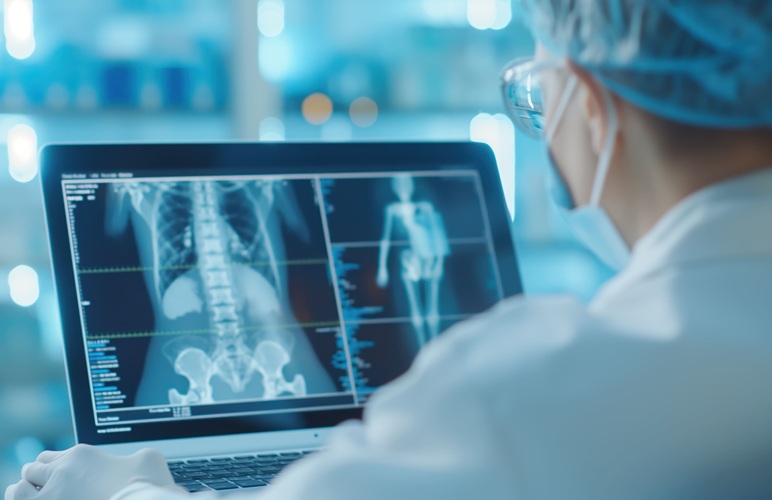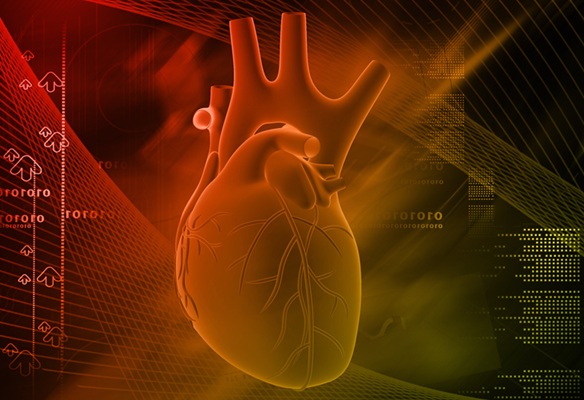Agreement to Expand Distribution for MR Volumetric Brain Atrophy Software
|
By MedImaging International staff writers Posted on 10 Feb 2014 |
New software is the only US Food and Drug Administration (FDA)-approved medical device capable of automatically detecting and quantifying atrophy in the human brain and provides accurate, and fully automated magnetic resonance imaging (MRI) post-processing capabilities to the physician’s mobile device or desktop.
This provides radiologists, neuroadiologists, and clinical researchers with a convenient and cost-effective way to quantify atrophy of brain structures to help identify a range of brain disorders, including conditions such as Alzheimer’s disease, epilepsy and traumatic brain injury.
CorTechs Labs (La Jolla, CA, USA) reported that it is renewing and expanding a partnership and distribution agreement with Invivo Corp. (Gainesville, FL, USA; a subsidiary of Philips Healthcare [Best, The Netherlands]) for NeuroQuant, a software solution for volumetric brain atrophy in the US healthcare market.
NeuroQuant is a crucial part of Invivo’s DynaSuite neuroimaging solution. “We’re pleased to expand our relationship with Invivo. With great expertise and presence in advanced clinical solutions for MRI, Invivo has been a terrific partner and has demonstrated exceptional growth with our NeuroQuant product in the US,” said Guri Stark, CorTechs Labs’ CEO. “We look forward to partnering with Invivo to continue NeuroQuant’s growth momentum and establishing our vision to have NeuroQuant become the standard test for all brain disorders, including Alzheimer’s disease, epilepsy and traumatic brain injury.”
“CorTechs Labs is a pioneer in the area of software for the aid of brain diagnostics and has a tremendous track record of reliability and automation in clinical practices,” stated Tom Tynes, director of strategic business development at Invivo. “We look forward to continuing to offer our DynaSuite neuroimaging solution with NeuroQuant, benefitting from its innovative approach to providing the much needed quantitative brain volumetric information.”
CorTechs Labs develops and markets cutting-edge brain imaging solutions used by neurologists and radiologists in hundreds of clinics and research centers around the world. CorTechs’ cornerstone product, NeuroQuant, is a breakthrough, 510(k)-cleared medical device that makes quantitative analysis of MRI images of the human brain a routine part of clinical practice.
Invivo is a subsidiary of Philips Healthcare (Best, The Netherlands) and develops progressive MRI coils, cutting-edge clinical solutions, and MRI-compatible interventional devices.
Related Links:
CorTechs Labs
Invivo
This provides radiologists, neuroadiologists, and clinical researchers with a convenient and cost-effective way to quantify atrophy of brain structures to help identify a range of brain disorders, including conditions such as Alzheimer’s disease, epilepsy and traumatic brain injury.
CorTechs Labs (La Jolla, CA, USA) reported that it is renewing and expanding a partnership and distribution agreement with Invivo Corp. (Gainesville, FL, USA; a subsidiary of Philips Healthcare [Best, The Netherlands]) for NeuroQuant, a software solution for volumetric brain atrophy in the US healthcare market.
NeuroQuant is a crucial part of Invivo’s DynaSuite neuroimaging solution. “We’re pleased to expand our relationship with Invivo. With great expertise and presence in advanced clinical solutions for MRI, Invivo has been a terrific partner and has demonstrated exceptional growth with our NeuroQuant product in the US,” said Guri Stark, CorTechs Labs’ CEO. “We look forward to partnering with Invivo to continue NeuroQuant’s growth momentum and establishing our vision to have NeuroQuant become the standard test for all brain disorders, including Alzheimer’s disease, epilepsy and traumatic brain injury.”
“CorTechs Labs is a pioneer in the area of software for the aid of brain diagnostics and has a tremendous track record of reliability and automation in clinical practices,” stated Tom Tynes, director of strategic business development at Invivo. “We look forward to continuing to offer our DynaSuite neuroimaging solution with NeuroQuant, benefitting from its innovative approach to providing the much needed quantitative brain volumetric information.”
CorTechs Labs develops and markets cutting-edge brain imaging solutions used by neurologists and radiologists in hundreds of clinics and research centers around the world. CorTechs’ cornerstone product, NeuroQuant, is a breakthrough, 510(k)-cleared medical device that makes quantitative analysis of MRI images of the human brain a routine part of clinical practice.
Invivo is a subsidiary of Philips Healthcare (Best, The Netherlands) and develops progressive MRI coils, cutting-edge clinical solutions, and MRI-compatible interventional devices.
Related Links:
CorTechs Labs
Invivo
Latest Industry News News
- GE HealthCare and NVIDIA Collaboration to Reimagine Diagnostic Imaging
- Patient-Specific 3D-Printed Phantoms Transform CT Imaging
- Siemens and Sectra Collaborate on Enhancing Radiology Workflows
- Bracco Diagnostics and ColoWatch Partner to Expand Availability CRC Screening Tests Using Virtual Colonoscopy
- Mindray Partners with TeleRay to Streamline Ultrasound Delivery
- Philips and Medtronic Partner on Stroke Care
- Siemens and Medtronic Enter into Global Partnership for Advancing Spine Care Imaging Technologies
- RSNA 2024 Technical Exhibits to Showcase Latest Advances in Radiology
- Bracco Collaborates with Arrayus on Microbubble-Assisted Focused Ultrasound Therapy for Pancreatic Cancer
- Innovative Collaboration to Enhance Ischemic Stroke Detection and Elevate Standards in Diagnostic Imaging
- RSNA 2024 Registration Opens
- Microsoft collaborates with Leading Academic Medical Systems to Advance AI in Medical Imaging
- GE HealthCare Acquires Intelligent Ultrasound Group’s Clinical Artificial Intelligence Business
- Bayer and Rad AI Collaborate on Expanding Use of Cutting Edge AI Radiology Operational Solutions
- Polish Med-Tech Company BrainScan to Expand Extensively into Foreign Markets
- Hologic Acquires UK-Based Breast Surgical Guidance Company Endomagnetics Ltd.
Channels
Radiography
view channel
Machine Learning Algorithm Identifies Cardiovascular Risk from Routine Bone Density Scans
A new study published in the Journal of Bone and Mineral Research reveals that an automated machine learning program can predict the risk of cardiovascular events and falls or fractures by analyzing bone... Read more
AI Improves Early Detection of Interval Breast Cancers
Interval breast cancers, which occur between routine screenings, are easier to treat when detected earlier. Early detection can reduce the need for aggressive treatments and improve the chances of better outcomes.... Read more
World's Largest Class Single Crystal Diamond Radiation Detector Opens New Possibilities for Diagnostic Imaging
Diamonds possess ideal physical properties for radiation detection, such as exceptional thermal and chemical stability along with a quick response time. Made of carbon with an atomic number of six, diamonds... Read moreMRI
view channel
New MRI Technique Reveals Hidden Heart Issues
Traditional exercise stress tests conducted within an MRI machine require patients to lie flat, a position that artificially improves heart function by increasing stroke volume due to gravity-driven blood... Read more
Shorter MRI Exam Effectively Detects Cancer in Dense Breasts
Women with extremely dense breasts face a higher risk of missed breast cancer diagnoses, as dense glandular and fibrous tissue can obscure tumors on mammograms. While breast MRI is recommended for supplemental... Read moreUltrasound
view channel
New Incision-Free Technique Halts Growth of Debilitating Brain Lesions
Cerebral cavernous malformations (CCMs), also known as cavernomas, are abnormal clusters of blood vessels that can grow in the brain, spinal cord, or other parts of the body. While most cases remain asymptomatic,... Read more.jpeg)
AI-Powered Lung Ultrasound Outperforms Human Experts in Tuberculosis Diagnosis
Despite global declines in tuberculosis (TB) rates in previous years, the incidence of TB rose by 4.6% from 2020 to 2023. Early screening and rapid diagnosis are essential elements of the World Health... Read moreNuclear Medicine
view channel
New Imaging Approach Could Reduce Need for Biopsies to Monitor Prostate Cancer
Prostate cancer is the second leading cause of cancer-related death among men in the United States. However, the majority of older men diagnosed with prostate cancer have slow-growing, low-risk forms of... Read more
Novel Radiolabeled Antibody Improves Diagnosis and Treatment of Solid Tumors
Interleukin-13 receptor α-2 (IL13Rα2) is a cell surface receptor commonly found in solid tumors such as glioblastoma, melanoma, and breast cancer. It is minimally expressed in normal tissues, making it... Read moreGeneral/Advanced Imaging
view channel
First-Of-Its-Kind Wearable Device Offers Revolutionary Alternative to CT Scans
Currently, patients with conditions such as heart failure, pneumonia, or respiratory distress often require multiple imaging procedures that are intermittent, disruptive, and involve high levels of radiation.... Read more
AI-Based CT Scan Analysis Predicts Early-Stage Kidney Damage Due to Cancer Treatments
Radioligand therapy, a form of targeted nuclear medicine, has recently gained attention for its potential in treating specific types of tumors. However, one of the potential side effects of this therapy... Read moreImaging IT
view channel
New Google Cloud Medical Imaging Suite Makes Imaging Healthcare Data More Accessible
Medical imaging is a critical tool used to diagnose patients, and there are billions of medical images scanned globally each year. Imaging data accounts for about 90% of all healthcare data1 and, until... Read more






















